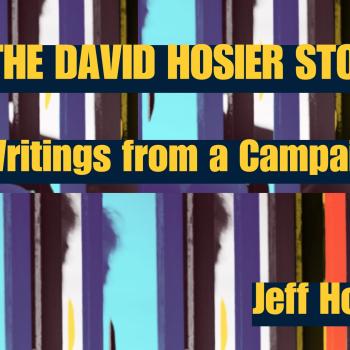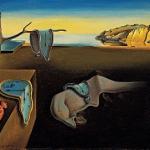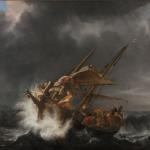“The Truth of the Father is the Son, and his shield is the Cross, whereby he surrounds you to protect you against the devil, the world and the flesh. In the Cross is humility against the devil’s pride; there is found Christ’s poverty, against the avarice of the world; there is crucifixion with nails against the lust of the flesh. “[1]
Christ the poor, weak man fights the good fight against the fallen powers of the world. Appearing defeated, he is shown to be victorious through the cross. The truth is beaten down, but cannot be overcome. Christ is resurrected in glory, showing the true wealth of heaven while the unjust rulers of the world find the poverty they have forced upon others becomes their out state in death. Christ demands from the rich all that they have unjustly taken from the poor. They are to give it back – with interest – following the example of Zacchaeus. They are given the chance in life to repent of their ways, to take up their cross, and follow Christ. But if they are not willing in life to justly treat those who have suffered at their hands, they will find all that they have gained in life is naught as they are spiritually impoverished in the next life, begging for the scraps of the saints to sustain them in their misery (cf. Luke 16:19 -31).
St. Francis represents the rich man who found the value of poverty. Rich in youth, he gave away all he had to become one with the poor. It is the example of Christ which he followed, who, as God, is rich beyond conception, but yet became man, emptied of all that richness so that he could be with the spiritually impoverished humanity and raise it up and to the spiritually rich, heavenly life God desired for it. God redistributes his own wealth in love, and St. Francis represents that it is such redistribution of wealth which leads to the development of the great saint, of the saint who helps preserve the truth of the Christian faith. St. Francis lifted up the Church by pointing out that the Church is for the poor, for the needy, for the oppressed. “Those who are well have no need of a physician, but those who are sick” (Luke 5:31 RSV). St. Francis showed the Church the poor who needed the Church’s attention and raised them up, calling into question the corruption of ecclesial and secular authorities because of their treatment of their fellow humanity. Together, with St. Dominic, St. Francis brought the kind of reform the Church needed for it to continue in the world: “Rather than retreat from the world, Francis and Dominic raised their voices in protest against the arbitrariness of lords, the iniquity of judges, the asperity of merchants and speculators, and the animosities that divided families, cities, and nations. The evils that they fought were avarice, pride, and violence, not the world: for the world, after all, was the work of God, a work whose beauty and harmony inspired Saint Francis to lyrical heights.”[2]
St. Francis understood the truth that those who thought themselves rich were really impoverished. While they unjustly took from others, they themselves lost true wealth, while the poor found it amongst themselves. Such spiritual wealth was, as it were, taken from the rich and given to the poor. This certainly explains why St Francis – and his band of merry men – would become so well loved by the people of the world. The ordinary person saw what he did for them. They had their dignity taken away from them by the rich, and Francis found a way to bring it back. The merry men of Francis were hated by those who trusted in their own power and authority, but they found the wisdom of Francis beat them every time they came to a fight. St. Francis, armed with the arrow of love, shot straight to the heart of the problem, hitting the mark right on target: he kissed the lepers showing that they were worthy of more respect and devotion than the petty tyrants which demanded obeisance:
Let the princes of the whole world take note of this,
and let them know:
it is not easy to fight against God,
that is, against the will of the Lord.
Stubborn insolence usually ends in disaster.
It relies on its own strength,
thus forfeiting the help of heaven.
If victory is to be expected from on high
then battles must be entrusted to the divine Spirit.[3]
The oppressed of the world had seen in Francis the way of God. They rejoiced in Francis because they saw in him the sign of God, the sign that God did not stand with their oppressors but with them. They saw Francis as the example of true religious life, and anyone who followed his example, they would esteem. The heroes which would come out of this would ones who resembled Francis in some way, even if they did not always follow through with the holiness of Francis. The Legend of Robin Hood represents how the Franciscan ideal would be taken in the secular world. In the earliest legends, there was no Friar Tuck, but there did not have to be – Robin Hood was Friar Tuck, with his love being not Maid Marion, but the Virgin Mary. Robin did not initially “steal from the rich and give to the poor,” but he did stand up for justice: he was the violent robber who took on the people in charge, demanding retribution from them for their unjust, deceitful ways. Those who acted fairly, Robin would treat in kind, and indeed, he was seen helping the rich if their ways were just and true. The issue was not of class warfare, but justice, and Robin Hood represented the justice the poor felt they lacked in the secular world. He represented, in a way, the underbelly of the Franciscan innovation: Francis tried to raise everyone up and to learn to love each other, but if that did not work, the power of blind justice would rise up, with its own merry band of transients, taking on the powers of artificial law for the sake of the real law. The two go hand in hand, representing the ideal and the consequences when the ideal is rejected.
This is not something which is merely a European phenomena. In China, one of the great works of literature, Outlaws of the Marsh, presents another group of outlaws striking out against the corruption of the state. It is more violent, the outlaws more questionable in behavior, than what we see in the legends of Robin Hood – and yet, the spirit behind the two remains the same. The general brotherhood of humanity is used in The Outlaws of the Marsh to bring the otherwise criminals together, working for each other, while the powers that be, corrupt as it had become, knew not this brotherhood and so does not have the great heroes of the day. The greatness of the outlaw in times of injustice does not justify all the behavior of the outlaw, but puts it in context, showing why they become the things of legend and remembered beyond the corrupt politicians who turned them into brigands.
Natural law promotes justice, but the abuse of natural law tries to use status to justify injustice. In times of great evil, in times of grave injustice, it is the outlaw who will rise up and create the demand for justice. Such an outlaw will strive for the return of the true law, as Robin Hood stood for the return of King Richard. An unjust law will make those who work for justice outlaws. Christ, the ultimate worker of the law, took the fate of the outlaw as his own. He died outside of the human law, showing the triumph of divine law. Just because something is called the law does not mean it is to be obeyed. When the law is evil, good people will be outlaws. But this does not mean there cannot be mediators. St Francis saved Christian Europe for a time because he was such a mediator; in a way, he lived the path of the outlaw. The people around him treated him with contempt as if he were an outlaw. And yet, his mission became approved by the ultimate law of the land – the Pope. Francis brought the outlaw and put them into the position of the law. This is what we must strive for, even today: reform of the law so the law can be preserved. But if that does not happen, what then should happen? What will we do? Will we work with the apparent authority, King John, or will we fight against such false authority, holding for the return of the once and future King Richard? That is what lies before us today. Which path will we choose? For the Christian there can be only one answer, the answer of Christ. We must be willing to accept earthly defeat if we want the truth to prevail.
[1] St. Anthony of Padua, Sermons for Sundays and Festivals. Volume IV. Trans. Paul Spilsbury (Padua: Edizioni Messaggero Padova, 2010), 50.
[2][2] Michel Mollat, The Poor in the Middle Ages: An Essay in Social History. Trans. Arthur Goldhammer (New Haven: Yale University Press, 1986), 120.
[3] Thomas of Celano, “The Remembrance of the Desire of a Soul” in Francis of Assisi: The Founder. Ed. Regis J. Armstrong, O.F.M. Cap.; J.A. Wayne Hellmann, O.F.M. Conv. And William J. Short, O.F.M. (New York: New City Press, 2000), 266.
















